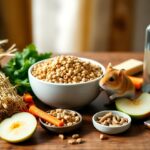Nutrition plays a crucial role in the health and well-being of your livestock throughout the changing seasons. As you plan your feeding regimen, it is important to consider the specific nutritional needs of your animals based on factors such as weather conditions, growth stages, and production goals. By developing a seasonal nutrition plan, you can ensure that your livestock receive the optimal balance of nutrients to support their overall health and performance. In this blog post, we will discuss the key considerations for creating a comprehensive and effective nutrition plan tailored to the seasonal requirements of your livestock.
Understanding Seasonal Changes in Livestock Nutrition
Nutritional Requirements in Different Seasons
Understanding the nutritional needs of your livestock is imperative for their health and productivity throughout the year. Different seasons bring different challenges in meeting these requirements. In winter, animals need more energy to stay warm, while in summer, they may require more water to prevent dehydration. Adjusting their diet accordingly is crucial to ensure optimal health and performance.
The Impact of Climate on Feed Availability
On top of meeting the nutritional needs of your livestock, the availability of feed is also influenced by the climate. Weather conditions such as droughts or heavy rainfall can affect the growth of pasture and crops, leading to fluctuations in feed availability. It is important to have contingency plans in place, such as storing surplus feed or sourcing alternative options, to ensure a steady food supply for your animals.
It is imperative to monitor weather patterns and anticipate potential disruptions in feed availability to proactively manage the nutritional needs of your livestock throughout the changing seasons. By staying informed and prepared, you can minimize the impact of climate-related challenges on your animals’ well-being.

Designing a Seasonal Nutrition Plan
Assessing Seasonal Forage Quality and Quantity
Nutrition plays a crucial role in the health and productivity of livestock. Assessing seasonal forage quality and quantity is necessary in designing an effective nutrition plan for your animals. By analyzing the nutrient content and availability of forage throughout the year, you can make informed decisions about supplementing with additional feed or adjusting the diet to meet the animals’ needs.
Creating a Balanced Diet Across Seasons
Forage is the primary source of nutrition for livestock, and it is important to ensure a balanced diet across all seasons. Different forages have varying nutrient profiles, and it is crucial to provide a mix of grasses, legumes, and other forages to meet the animals’ requirements for protein, carbohydrates, vitamins, and minerals. By creating a diverse diet plan, you can help maintain the health and well-being of your livestock throughout the year.
Seasons: Each season brings its own challenges in terms of forage availability and quality. In the winter, forage may be lower in nutrients, requiring supplementation with hay or grains. During the spring and summer, animals may have access to lush pastures, but careful monitoring is needed to prevent overconsumption and nutrient imbalances. In the fall, forage quality may decline again, necessitating adjustments to the diet. By planning ahead and adjusting the nutrition plan according to seasonal changes, you can ensure the health and productivity of your livestock year-round.

Supplements and Nutritional Adjustments
Identifying the Need for Nutritional Supplements
The key to keeping your livestock healthy and productive lies in providing them with a well-balanced diet. However, there are times when your animals may require additional nutritional support in the form of supplements. It is important to regularly assess the condition and performance of your livestock to identify any deficiencies or specific needs that may warrant the inclusion of supplements in their diet.
Strategies for Adjusting Livestock Feed Composition
One of the strategies for adjusting the feed composition of your livestock is to closely monitor their growth stages and production levels. Different stages of growth and production require varying levels of nutrients, so it is crucial to adjust the feed composition accordingly. Additionally, environmental factors such as weather conditions and available forage can also impact the nutritional requirements of your livestock, necessitating adjustments to their diet.
Livestock nutrition is a complex and dynamic field that requires careful consideration and regular assessment to ensure the health and well-being of your animals. By identifying the need for nutritional supplements and implementing strategies to adjust their feed composition, you can optimize the performance and overall health of your livestock.

Monitoring and Evaluating the Nutrition Plan
Techniques for Tracking Livestock Health and Performance
Plan to use a combination of techniques to closely monitor the health and performance of your livestock. This may include regular weighing, body condition scoring, observing grazing behavior, and record-keeping of feed intake. By implementing these methods, you can make informed decisions about the effectiveness of your nutrition plan and make adjustments as needed.
When to Revise Your Seasonal Nutrition Plan
On occasion, it may be necessary to revise your seasonal nutrition plan based on various factors. Plan to reevaluate your plan if you notice any changes in your livestock’s performance, such as weight loss, decreased milk production, or poor coat condition. Additionally, changes in environmental conditions or forage quality may also warrant a review of your nutrition plan. Regularly assessing and making necessary adjustments will ensure that your livestock receive the optimal nutrition they require throughout the seasons.
Conclusion
Considering all points discussed, creating a seasonal nutrition plan for your livestock is crucial in ensuring their health and productivity throughout the year. By understanding the nutritional needs of your animals based on the changing seasons, you can make informed decisions on their diet and supplementation. Planning ahead and adjusting the feeding regimen according to seasonal requirements will help optimize growth, reproduction, and overall well-being of your livestock. Consult with a nutritionist or veterinarian to tailor a specific plan for your animals, and closely monitor their condition to make necessary adjustments. A well-designed seasonal nutrition plan will ultimately lead to happier, healthier, and more profitable livestock on your farm.
FAQ
Q: Why is it important to create a seasonal nutrition plan for your livestock?
A: Creating a seasonal nutrition plan ensures that your livestock receive the appropriate nutrients they need at different times of the year to maintain their health and productivity.
Q: How can I determine the nutritional requirements of my livestock for each season?
A: Consult with a livestock nutritionist or veterinarian to assess the specific nutritional needs of your livestock based on factors such as breed, age, weight, and activity level for each season.
Q: What should be included in a seasonal nutrition plan for livestock?
A: A seasonal nutrition plan should include a balanced diet of protein, carbohydrates, fats, vitamins, and minerals tailored to meet the changing needs of your livestock throughout the year.
Q: How often should I update my livestock’s seasonal nutrition plan?
A: It is recommended to review and update your livestock’s seasonal nutrition plan with the guidance of a professional at least twice a year to ensure it aligns with their changing requirements.
Q: What are the consequences of not having a seasonal nutrition plan for your livestock?
A: Without a proper seasonal nutrition plan, livestock may experience nutrient deficiencies or imbalances, leading to health issues, reduced productivity, and increased susceptibility to diseases.
Q: How can I source seasonal feed and supplements for my livestock?
A: Work with local feed suppliers, consult with a nutritionist to create custom feed blends, or consider growing your own forage to provide seasonal nutrition options for your livestock.
Q: What other factors should I consider when creating a seasonal nutrition plan for my livestock?
A: In addition to nutrition, factors such as water quality and availability, pasture management, environmental conditions, and stress levels should be taken into account when developing a comprehensive seasonal nutrition plan for your livestock.










